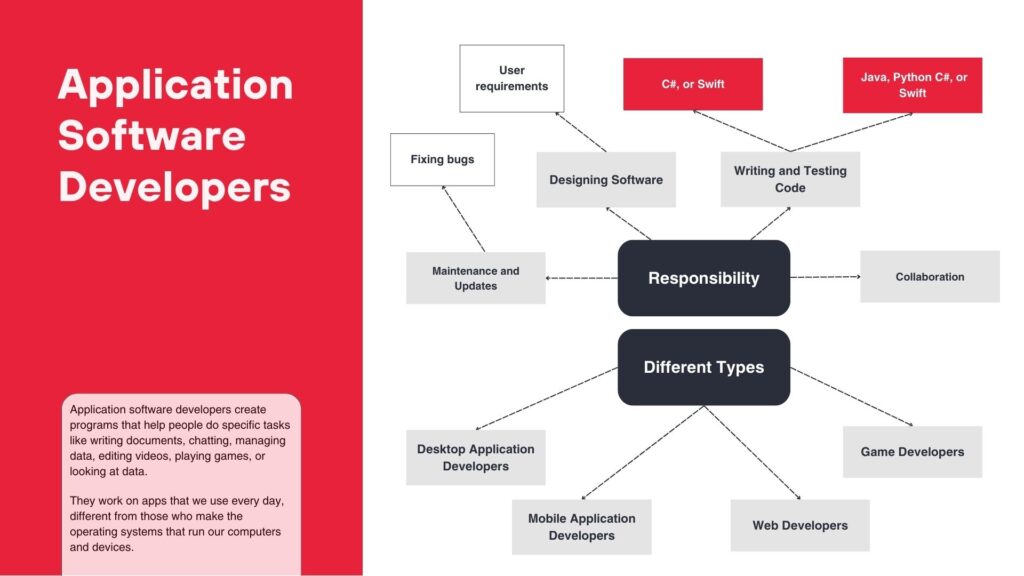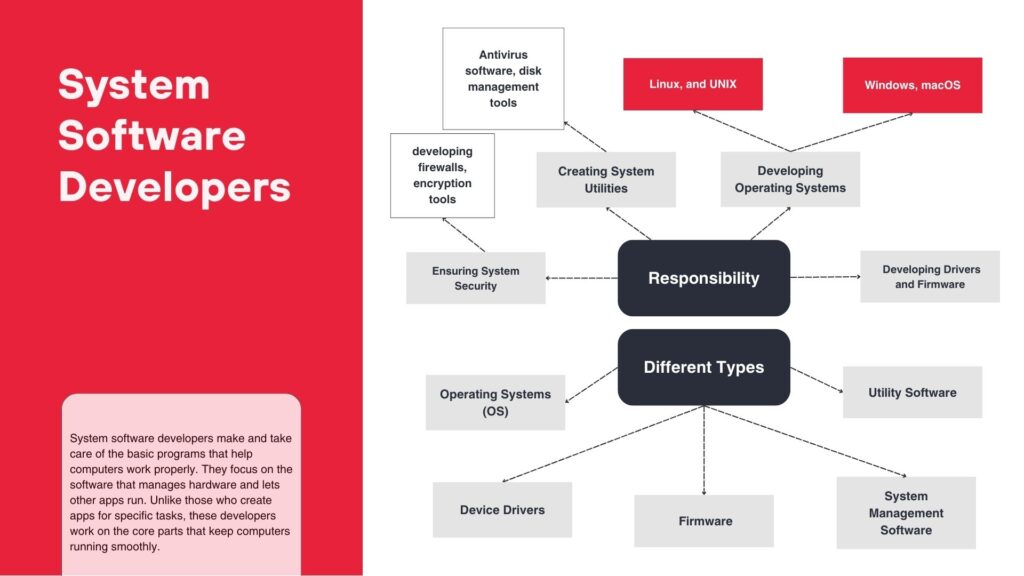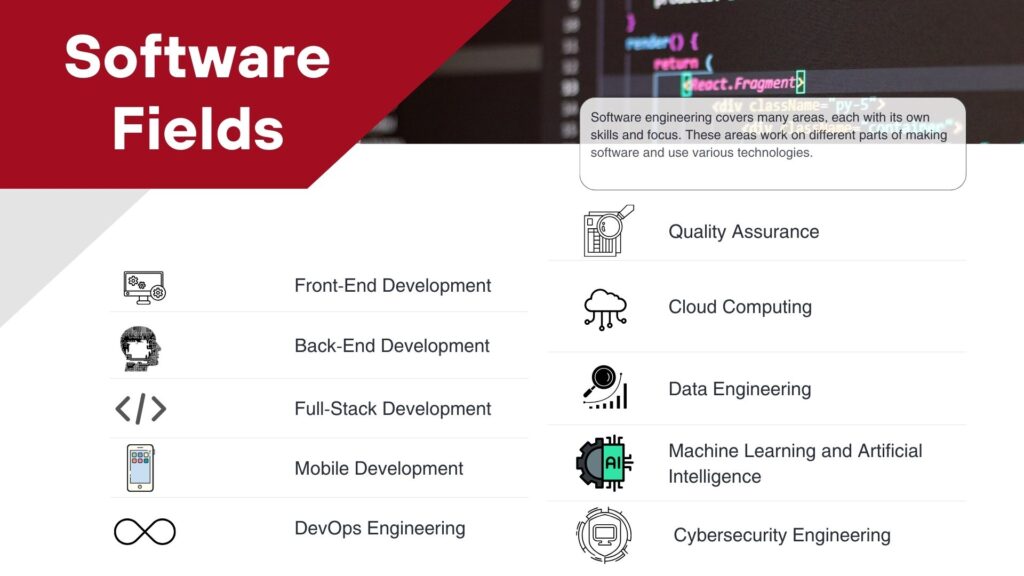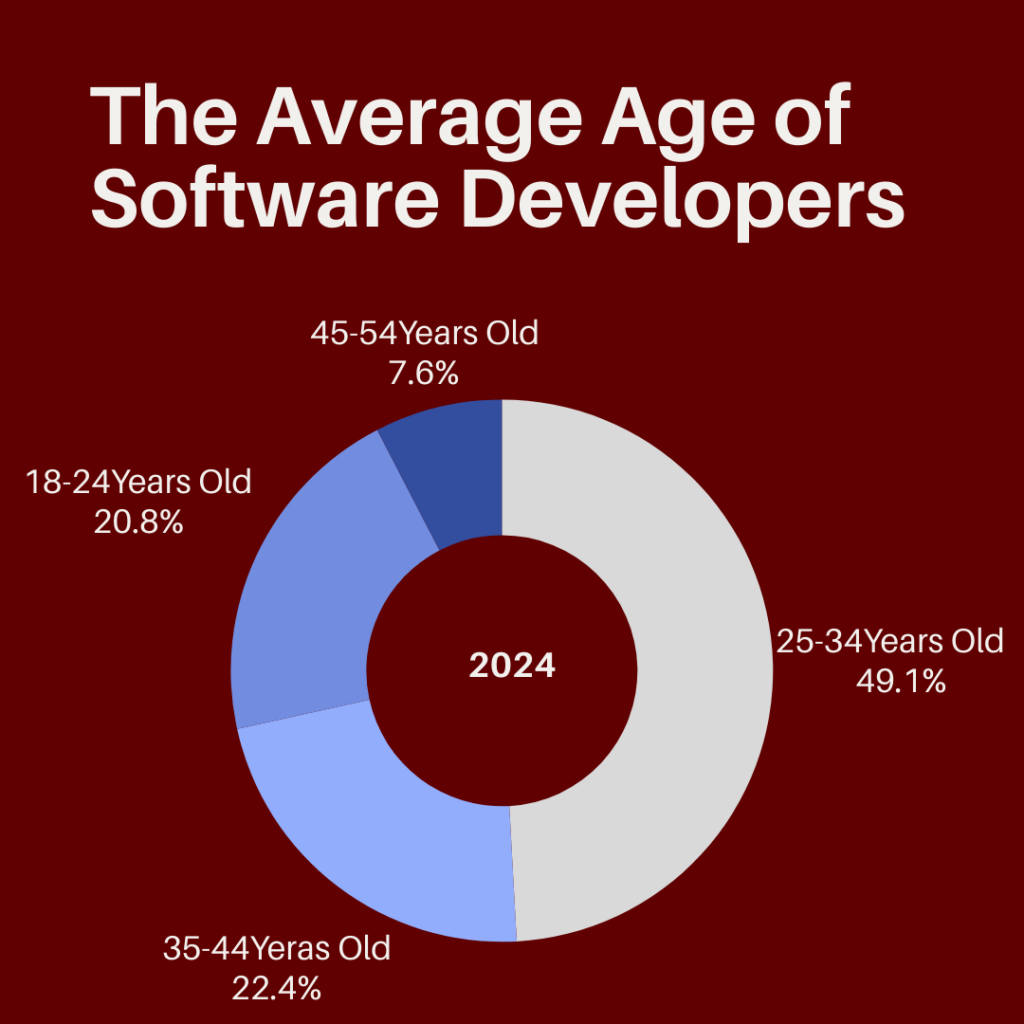In the digital era, software engineers are like the magicians behind the scenes. They build the apps we use every day, make our computers run, and write the code that keeps websites working. But what does being a software engineer really mean, and why is this job so important right now? As we dig into this, we’ll look at what skills these tech wizards need, what they do all day, and how they make a big difference in our tech-heavy lives. This journey will help us understand more about software engineers – the people who make sure our digital world keeps spinning smoothly.
What is Software Engineering
Software engineering involves both creating new applications and improving existing ones. A software engineer needs a blend of software programming and development knowledge, along with an understanding of engineering principles. They often work in teams to build complex systems from the ground up, ensuring that systems are efficient, scalable, and error-free.
The role can be divided into two main types: application software developers, who design consumer applications, and systems software developers, who create operating systems, network control systems, and more. Software engineers must be proficient in programming languages, and software development frameworks, and must understand the lifecycle of software development from conception through to maintenance.
1. Application Software Developers
Application software developers are professionals who specialize in designing, building, and maintaining software applications that are designed to perform specific tasks for users. These tasks can range from everyday activities, such as word processing, communication, and data management, to more complex operations like editing videos, playing games, or analyzing data. Unlike system software developers, who focus on creating the operating systems that run computers and devices, application software developers concentrate on the software that users interact with directly.

Key Responsibilities:
1. Designing Software
Designing software is a preliminary and vital stage where developers conceptualize the application’s core functions and user interface. This process demands a thorough understanding of user requirements and the creative ability to envision how the software will address those needs effectively. Through collaboration with designers and product managers, developers help draft the initial blueprints, including wireframes and system architecture plans. This step ensures that the project starts with a clear, shared vision, setting a solid foundation for development.
2. Writing and Testing Code
In this phase, developers bring the application to life by writing code in languages like Java, Python, C#, or Swift, each chosen based on the project’s specific needs. Coding is an iterative process that goes hand in hand with testing, where developers write unit tests, integration tests, and system tests to ensure the software functions correctly. This rigorous testing cycle helps identify bugs early on, ensuring the application is robust and performs as intended before it reaches the end users.
3. Maintenance and Updates
After the software is launched, the focus shifts to maintenance and updates to keep the application relevant and functional over time. Developers work on adding new features based on user feedback, fixing bugs, and ensuring the software remains compatible with evolving technology. This continuous improvement cycle is crucial for enhancing user experience, extending the software’s lifespan, and responding to the ever-changing tech landscape.
4. Collaboration
Application developers often work as part of a team that includes other developers, designers, analysts, and stakeholders. They must communicate effectively to ensure that the application meets its intended goals.
Types of Application Software Developers
There are several types of application software developers, focusing on different areas of development:
1. Desktop Application Developers
Desktop application developers focus on creating software that is installed and runs on desktop operating systems such as Windows, macOS, or Linux. These applications are designed to leverage the full computing power and resources available on desktop or laptop computers. Developers in this category use a variety of programming languages and frameworks, depending on the platform and the application’s requirements.
For example, they might use .NET and C# for Windows applications, Objective-C or Swift for macOS, or Java and GTK for Linux.
2. Mobile Application Developers
Mobile application developers create apps specifically designed for mobile devices, including smartphones and tablets. This field is divided into two main areas: native app development, which involves creating apps for specific operating systems like iOS (using Swift or Objective-C) and Android (using Java or Kotlin); and cross-platform development, where developers use frameworks like React Native or Flutter to build applications that can run on multiple mobile operating systems from a single codebase.
The challenge for mobile developers lies in optimizing app performance and user experience within the constraints of smaller screens and less powerful processors, along with considering factors like battery life and network connectivity.
3. Web Developers
Web developers are tasked with building web applications that run within a web browser, eliminating the need for installation on specific operating systems. This category includes everything from designing simple static websites to developing complex, interactive web-based applications (web apps) that can perform tasks similar to traditional desktop software.
Web developers must be proficient in a range of technologies, including HTML, CSS, and JavaScript, as well as frameworks and libraries like React, Angular, or Vue.js. They must also understand server-side programming for backend development, using languages such as Python, Ruby, or PHP. The focus here is on creating accessible, responsive, and secure applications that provide a seamless user experience across a variety of devices and screen sizes.
4. Game Developers
Game developers are specialized software engineers who design and create video games for computers, consoles, mobile devices, and online platforms. This field combines creativity with technical skills, as developers work on game design, storyboarding, graphics rendering, artificial intelligence, sound design, and user interface development. They often use game development engines like Unity or Unreal Engine, which provide tools for both 2D and 3D game development.
2. System Software Developers
System software developers specialize in creating, developing, and maintaining the core software that enables computer systems to operate. This category of software development focuses on the foundational programs that manage the hardware and provide a platform for running application software. Unlike application software developers, who build software that performs specific tasks for users, system software developers work on the underlying systems that keep computers running efficiently.

Key Responsibilities:
1. Developing Operating Systems
The most recognized type of system software is the operating system (OS), like Windows, macOS, Linux, and UNIX. These systems manage hardware resources and provide the basic functions necessary for the operation of application software.
2. Creating System Utilities
This involves developing the tools and utilities that help in maintaining, analyzing, and optimizing the system, such as antivirus software, disk management tools, and system diagnostics.
3. Developing Drivers and Firmware
Drivers are specialized programs that enable the operating system to communicate with hardware devices, like printers, graphics cards, and storage devices. Firmware, on the other hand, is low-level software that is embedded directly into the hardware to control its functions.
4. Ensuring System Security
System software developers work on features and tools that protect the computer system from malicious software, unauthorized access, and data breaches. This includes developing firewalls, encryption tools, and secure boot mechanisms.
Skills and Expertise
System software development requires a deep understanding of computer architecture, hardware, and low-level programming. Key skills and expertise include:
1. Proficiency in System-Level Programming
This skill involves using languages like C, C++, and assembly language, which are crucial for their low-level access to hardware and memory. Mastery of these languages allows developers to directly manipulate system resources, enabling precise control over software performance and efficiency.
2. Understanding of Operating System Principles
Developers need a deep understanding of core operating system functionalities such as process management, memory management, file systems, and concurrency. This knowledge is essential for creating software that efficiently manages system resources and ensures smooth application performance.
3. Familiarity with Hardware and Architecture
A strong grasp of computer architecture, including knowledge of processors, storage devices, and input/output systems, is vital. This familiarity enables developers to optimize software to take full advantage of the hardware’s capabilities, improving system performance and reliability.
4. Problem-Solving Skills
The ability to tackle complex issues related to system performance, stability, and security is key. System software developers must be able to identify and resolve performance bottlenecks, design efficient algorithms, and implement robust security measures to safeguard the system.
Types of System Software
1. Operating Systems (OS)
An operating system is the most well-known type of system software, acting as an intermediary between application software and computer hardware. It manages system resources such as the processor, memory, disk space, and peripheral devices. Operating systems provide a user interface, such as a graphical user interface (GUI) or command line, allowing users to interact with the computer. Examples include Windows, macOS, Linux, and UNIX.
2. Device Drivers
Device drivers are specialized system software that allows the operating system and applications to interact with hardware components. Each driver facilitates communication between the operating system and a specific hardware device, like a printer, video card, or keyboard. Without the appropriate driver, the OS wouldn’t be able to fully utilize the hardware’s capabilities.
3. Firmware
Firmware is a specific type of system software that provides low-level control for a device’s specific hardware. It’s typically embedded into the hardware itself and is essential for basic device operations. Firmware can be found in various devices, from traditional computers and their components (like BIOS/UEFI) to household appliances and IoT devices. Unlike other system software, firmware rarely needs to be updated by the end user.
4. Utility Software
Utility software programs perform specific tasks that help manage, maintain, optimize, or protect the computer. These tools can include antivirus software, disk cleanup and management tools, file compression tools, and backup software. While they operate in the background and are less visible than operating systems or applications, utilities are crucial for ensuring system stability and security.
5. System Management Software
This type of software is used for managing computer systems on a larger scale, such as in enterprise environments. System management software includes network management tools, system monitoring and analysis utilities, and server management applications. These tools help IT professionals oversee and control complex computing environments, ensuring that all components work harmoniously and efficiently.
Hard Skills for Software Engineers
Hard skills in software engineering refer to the specific technical abilities and knowledge that are required to perform the job. These skills are often measurable and can be acquired through education, training, and practical experience. For software engineers, hard skills include:
1. Programming Languages
Think of programming languages like tools in a toolbox, each with a special job. Python is great for beginners and data science, Java for building complex applications, C++ for performance-critical tasks, JavaScript for making websites interactive, and SQL for talking to databases. They’re the building blocks for different tech projects.
2. Software Development Methodologies
These are like recipes for managing projects. Agile, Scrum, and Kanban are methods that help teams work better together, break big projects into smaller parts, and keep improving the process. It’s like organizing teamwork in a flexible, efficient way to get things done faster and with better quality.
3. Version Control Systems
Imagine writing a document and wanting to save every change so you can undo mistakes. Git is a tool that helps developers do just that with code. It keeps track of all changes, allowing multiple people to work on the same project without messing up each other’s work. It’s essential for team coding and keeping projects organized.
4. Database Management
Databases are like digital libraries where data is stored. SQL databases organize data into neat tables (think Excel but more powerful) and are great for structured data. NoSQL databases are more flexible and can handle a variety of data types, making them perfect for large sets of diverse data. Knowing how to organize, retrieve, and manage this data is key to building efficient applications.
5. DevOps Practices
DevOps connects development (coding) with operations (making code work in the real world), focusing on automating the process of software delivery and infrastructure changes. It involves practices like CI/CD for automating the testing and deployment of code, using Docker for creating lightweight, portable code environments, and Kubernetes for managing these environments in large-scale systems. It’s about making the process of developing, testing, and deploying software faster and more reliable.
6. Testing
Writing tests is like having a safety net for your code, ensuring it does what it’s supposed to do and catching mistakes before they become problems. Automated tests can check small pieces of code (unit tests), how parts work together (integration tests), or the entire application (end-to-end tests). It’s a crucial step in building trustworthy, bug-free software.
Soft Skills for Software Engineers
Soft skills play a crucial role in a software engineer’s career, complementing technical abilities with interpersonal and personal attributes that enhance overall performance and teamwork. Here are some key soft skills for software engineers:
1. Communication
Clear communication is key in software engineering, enabling you to explain complex ideas simply and understand others’ needs. It’s about bridging the gap between technical and non-technical people, ensuring everyone is on the same page.
2. Teamwork and Collaboration
Working well in a team means being open to feedback, sharing knowledge, and supporting your colleagues. It’s about combining diverse skills and perspectives to create better solutions together.
3. Problem-Solving
This skill is all about thinking creatively to overcome obstacles and develop effective solutions. Good problem-solvers can break down complex issues into manageable parts and find the best path forward.
4. Adaptability
The tech world changes fast. Being adaptable means, you can quickly learn new technologies, adjust to changing project requirements, and thrive in dynamic environments.
5. Time Management
Juggling multiple tasks efficiently is crucial. Good time management means prioritizing effectively, setting realistic deadlines, and delivering quality work on schedule.
6. Attention to Detail
In coding, even a small mistake can cause big issues. Being detail-oriented helps you catch errors early, write clean code, and ensure the software performs as intended.
7. Empathy and Emotional Intelligence
Understanding and sharing the feelings of others helps in working better in teams, dealing with stress, and creating products that truly meet user needs. It’s about being mindful of others’ perspectives and emotions.
The Fields of Software Engineering
Software engineering is a vast field with numerous specializations, reflecting the diverse range of applications for software in today’s world. Each field requires a unique set of skills and knowledge, focusing on different aspects of the software development process or on specific technologies and industries. Here’s a look at some of the different fields within software engineering:

1. Front-End Development
What They Do: Front-end developers create the part of websites and web applications that users interact with directly. They focus on layout, design, and interactivity.
Tools and Languages: They use HTML to structure web pages, CSS for styling and layout to make pages look attractive, and JavaScript to add interactivity, like forms that respond when you fill them out. Frameworks like React or Angular provide a standardized, powerful foundation for building complex, dynamic user interfaces quickly.
Goal: The main aim is to ensure that the website is user-friendly, responsive (works well on all devices and screen sizes), and aesthetically pleasing, enhancing the user’s experience.
2. Back-End Developmet
What They Do: Back-end developers focus on the server, database, and application logic—everything that users don’t see but that powers the website. They handle data storage, security, and business logic.
Tools and Languages: Common languages include Java, Python, and Ruby. They interact with databases using SQL or NoSQL to store and retrieve data. They also work on server management and architecture, ensuring that the website can handle traffic and data securely and efficiently.
Goal: Their goal is to create robust, scalable systems that process and manage data effectively, making sure the front-end has what it needs to provide a smooth user experience.
3. Full-Stack Development
What They Do: Full-stack developers are jacks-of-all-trades in web development, with knowledge of both front-end and back-end technologies. They can develop a web application from start to finish.
Tools and Languages: They are proficient in front-end languages and frameworks, as well as back-end programming languages and database management. They understand how to make different parts of a web application communicate effectively.
Goal: Their main objective is to oversee the entire development process of a web application, ensuring that both the client-facing and server-side elements work harmoniously together.
4. Mobile Development
What They Do: Mobile developers specialize in building applications for mobile devices, focusing on optimizing for small screens and device-specific features.
Platforms: They may work on native platforms using Swift (for iOS) or Kotlin (for Android) to create apps that are optimized for one specific platform or use cross-platform frameworks like Flutter or React Native to write code once and deploy it on both iOS and Android.
Goal: The aim is to create intuitive, performant, and engaging applications that leverage the unique features of smartphones and tablets, such as GPS, cameras, and gestures.
5. DevOps Engineering
What They Do: DevOps engineers play a crucial role in modern software development by fostering a culture of collaboration between the development (Dev) teams that create software and the operations (Ops) teams that deploy and maintain it. Their work is centered on automating and optimizing processes throughout the software development lifecycle (SDLC), from coding and building to testing, deployment, and operation.
Tools and Practices: They use continuous integration and continuous deployment (CI/CD) tools to automate testing and deployment. They also work with containerization technologies like Docker and orchestration tools like Kubernetes to manage and scale applications.
Goal: The primary goal is to increase efficiency, improve reliability, and shorten the development cycle, making software updates faster and more seamless.
6. Software Testing and Quality Assurance
What They Do: QA engineers focus on ensuring that software meets all specifications and requirements before it’s released to users. They identify bugs and issues that could affect functionality or user experience.
Methods: They use manual testing to explore the software’s interface and automated testing frameworks to execute repetitive tasks and test cases, ensuring that every part of the application works as expected under various conditions.
Goal: The primary goal of QA engineers is to deliver defect-free software that performs reliably, ensuring a positive and seamless user experience for all end-users.
7. Cloud Computing and Cloud Engineering
What They Do: Cloud engineers craft and oversee cloud-based solutions, utilizing platforms like AWS, Azure, or Google Cloud. They’re the architects behind scalable, flexible applications, ensuring these can grow and adapt to the needs of the business. Their expertise spans the entire cloud ecosystem, from deploying applications to managing cloud infrastructure.
Focus Areas: They may focus on cloud storage, computing, networking, or security, designing solutions that leverage the cloud for enhanced performance and reliability.
Goal: The ultimate aim is to leverage cloud technology to transcend the limitations of traditional hardware. Cloud engineers enable organizations to operate on a global scale, providing services that are accessible anywhere, anytime, without the need for physical infrastructure, thereby ensuring efficiency and flexibility in operations and service delivery.
8. Data Engineering and Big Data
What They Do: Data engineers build and maintain the infrastructure and tools necessary to handle large volumes of data. They create data pipelines that collect, store, and analyze data from various sources.
Technologies: They work with big data technologies like Hadoop and Spark, as well as database management systems, to process and organize data efficiently.
Goal: Their goal is to make data accessible and usable for data scientists and analysts, ensuring that data is reliable, secure, and ready for analysis.
9. Machine Learning and Artificial Intelligence
What They Do: ML and AI engineers teach computers to think and learn like humans, but much faster. They create special instructions (algorithms) that help computers recognize patterns and make smart choices without being told exactly what to do for each decision. This work lets computers do things like understand what we say, predict what might happen next, or even drive cars by themselves. It’s like giving computers a brain that keeps getting smarter the more it learns.
Applications: They apply these technologies to a wide range of areas, including natural language processing, computer vision, and predictive analytics, creating systems that can understand, learn, and adapt.
Goal: The aim is to build intelligent systems that can perform complex tasks, improve over time through learning, and provide insights or automate processes that were previously impossible or highly manual.
10. Cybersecurity Engineering
What They Do: Cybersecurity engineers are the guardians of computer systems, networks, and data. They work tirelessly to fend off cyberattacks, continuously evaluating the safety of digital environments. By staying ahead of threats, they prevent attacks before they happen and respond swiftly to any security breaches.
Strategies: Their toolkit includes powerful methods like encryption (coding information so only authorized users can read it), firewalls (digital barriers that block unauthorized access), and intrusion detection systems (alarms that notify them when someone tries to break in). These tools are crucial in maintaining the security and privacy of digital information.
Goal: Their ultimate mission is to ensure a safe digital world, where people’s private information and company data are protected against cybercriminals. They aim to build and maintain robust digital defenses that keep sensitive data secure and make sure technology infrastructures can stand up to any cyber threat.
What is the average age of a Software Developer?

The average age of software developers can vary widely across different countries, companies, and sectors. However, industry surveys and studies often suggest that the median age tends to be in the late 20s to mid-30s. This range reflects the influx of young professionals entering the field, driven by the growing demand for software development skills and the accessibility of coding education through bootcamps, online courses, and traditional degrees. It’s important to note that software development is a field that values skill and experience, welcoming professionals of all ages.
Educational Pathways
To become a software engineer, there are several educational paths available, each with its advantages and drawbacks. Understanding these can help aspiring software engineers choose the route that best fits their needs and circumstances.
1.University Degrees:
Pros: A degree in computer science or a related field from a university provides a comprehensive foundation in software engineering principles, mathematics, and computer science theory. It also offers networking opportunities, internships, and career services.
Cons: University programs can be costly and time-consuming, taking about four years to complete. Additionally, the pace of technological change means some curricula may not cover the latest tools and technologies extensively.
2. Coding Bootcamps
Pros: Bootcamps are intensive, short-term training programs that focus on practical, job-ready skills. They are designed to quickly prepare students for entry-level positions in software development and are often more affordable than university degrees.
Cons: The accelerated learning pace might not suit everyone, and the depth of knowledge gained may not be as comprehensive as what a university degree offers. The focus is more on immediate employability in specific programming languages or frameworks rather than on underlying principles.
3. Online Courses
Pros: Online platforms offer flexibility in terms of pacing and schedules, making them ideal for those who are working or have other commitments. They can be a cost-effective way to learn specific skills or technologies and to keep up with current trends.
Cons: Learning in isolation can be challenging without the support structure of a traditional classroom. The vast array of courses available can also be overwhelming, and it may be difficult to determine which ones offer quality education.
4. Self-Taught Route
Pros: The self-taught approach allows for a highly personalized learning experience. Learners can focus on their interests and learn at their own pace, often utilizing free or low-cost resources.
Cons: Without formal guidance, it can be easy to overlook fundamental concepts. Self-taught developers may also find it challenging to prove their skills to potential employers without formal credentials or a portfolio of projects.
Each of these paths has the potential to lead to a successful career in software engineering. The best choice depends on an individual’s learning style, financial situation, and career goals. Many software engineers combine elements from different paths, such as completing a degree and then supplementing their education with online courses or bootcamps to learn specific new technologies.
Conclusion
In conclusion, the role of software engineers in today’s digital era cannot be overstated. As the architects behind the applications and systems that power our daily lives, they blend technical skills with creativity and problem-solving to build the digital infrastructure of our world. From developing user-friendly applications to ensuring the smooth operation of underlying systems, software engineers work tirelessly to make technology accessible, reliable, and innovative.
The journey to becoming a software engineer is as varied as the field itself, with multiple educational pathways offering different benefits and challenges. Whether through university degrees, coding bootcamps, online courses, or self-taught methods, aspiring engineers have many routes to acquiring the skills needed for this dynamic and rewarding career.
Moreover, the broad spectrum of specializations within software engineering, including front-end and back-end development, mobile and web development, cloud engineering, and cybersecurity, among others, ensures that individuals can find a niche that matches their interests and talents.
